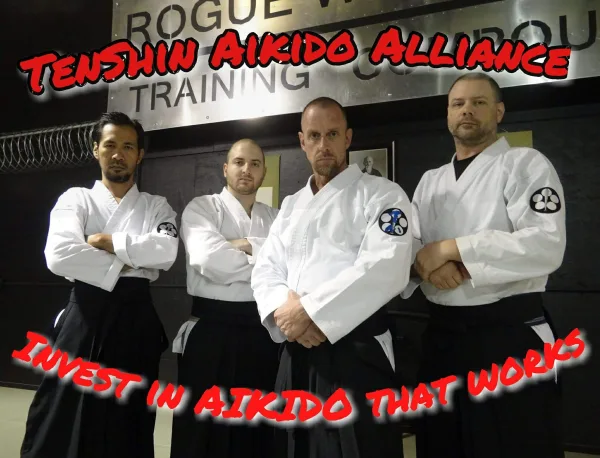Rogue Warriors Training Compound
About
Lenny Sly Sensei's methodology of Aikido is swift, brutal, and effective for real world application. Students train all levels together to grow at a faster rate.
Aikido is a circular art, and much like the ying and yang principle, requires both the ability to take and receive an attack. Skill is attained through developing both - the Uke and the Nage. 100% focus of both is required to hone skill and truly be able to understand how the technique fully works. By learning proper technique to receive an attack without harm, it allows each training partner to practice, through repetition, each skill to the highest level of ability - eventually to practical and devastating speed. Only through this will one be able to really feel how and what is necessary force in the real world. Compassion and trust is vital with training partners so that everyone can train safely to the next level together.
TenShin Aikido integrates more than traditional Aikido techniques into its overall training. Hand deflections, attitude and ukemi, ubidori techniques, are just some of the characteristics that differentiate this art from the traditional form.
The Uke needs to provide a true and honest attack to simulate practical, real world application to the Nage. In turn, the Nage must respond with with true and honest use of force to this attack in order to simulate response in the most "real situation" type feel possible. Without this attitude in training, when faced with an actual life-threatening situation, the response will not be enough to subdue the attack and the entire situation will feel completely foreign.
Hand deflections and style were developed from the methodology of sword techniques. Redirection and deflection of force in these hand and arm deflections, such as Uke Nagashi, mimic these kenjitsu techniques to allow force to pass or "glide down the sword" to transition into the next movement.
This is not Aikido at yoga pace, blending and moving into beautiful dance.
This is Aikido with JET FUEL. This is beautiful violence.
Photos and videos

Reviews
TJ P.
Nora T.
Brett P.
Andrew R.
Rod D.
Bradley B.
Frequently asked questions
What is your typical process for working with a new student?
Basic techniques are the primary focus. As more advanced techniques are presented, focus and compassion are used by all students to bring the new student up to the higher levels.